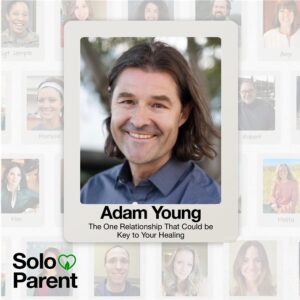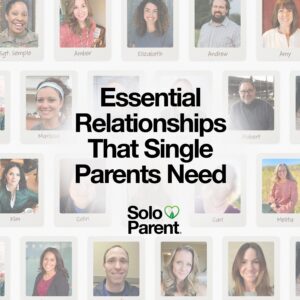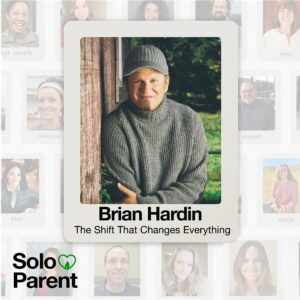What is your most used calm down technique?
Breathing. Deep breaths in through my nose, out through my mouth. Sometimes it’s the box breathing, sometimes it’s closing one nostril and breathing in, opening the other nostril and breathing out. There are several different breathing techniques that you can do whether it’s calming anxiety in the moment or getting yourself to a more grounded, stable mindset.
We’ve all experienced a time when our emotions got the best of us and we lost our cool as single parents. We don’t have a partner to help us co-regulate and to help stabilize our emotions. Sometimes it feels nearly impossible to manage our responses well when we’re already trying to manage everything else. So how can we regulate big emotions on our own so that we can model healthy emotional regulation for our kids? This is an important conversation that we all face on the daily.
Today we’re going to cover this in three main points. Number one, we’re going to talk about the basics of emotional regulation. Number two, we’ll talk about the importance of emotional regulation as a parent. And finally, we’ll talk about the tools for stabilizing in unstable moments.
What is emotional regulation?
It really is so important and let me state that even though I am a pre-licensed therapist (in the process of that) in the state of Tennessee, I have not always done this well. I look back on seasons with my kids who are now 19 and 21 and I learn from my mistakes. It’s just true. I want to state that because I think maybe some of our listeners, maybe a lot, feel a sense of regret or failure. They’ve flown off the handle, they’ve let their kids get the best of them, their temper has escalated. You’re not alone. I want to state that you’re not alone. The process of emotional regulation is so significant. When we’re feeling that firestorm inside or something brewing, or we’re beginning to feel flooded, it’s part of that definition that there’s something happening internally or externally that provokes a subjective experience in us.
And so I notice something: my kids roll their eyes at me, that driver cuts me off in traffic, or I get on the interstate and it’s gridlocked and I’m thinking, “I’ve got to get somewhere.” Something happens and all of a sudden I’m having this subjective experience. When we notice anything like that response is when we can begin the process of emotional regulation and begin to notice what’s happening. What’s happening in my body? Am I clenching my fist? Did I immediately start to tighten up my core? Am I noticing a lump in my throat or a flutter inside? Those cues are the very first step when we begin to recognize and notice, “Wow, I’m feeling something really big right here.”
When we talk about emotional regulation, what’s the goal of that word?
The goal is to have a little bit of time to pause and to begin to consider, “Whoa, I’m having this feeling. How do I respond to it?” We don’t want to ignore the feelings or they’ll stay underneath like an undercurrent and take us places we don’t want to go. We have to pay attention and say, “Whoa, I’m feeling something.” Important information is needed from that feeling so I know what the next healthy action step is. So, it’s not being controlled by that immediate big emotion, it’s giving space. It’s noticing it and allowing a buffer of time between feeling that feeling and reacting to it.
We’ve heard the great Dr. Chip Dodd talk about how no emotion is good or bad; it’s just true or untrue. But we tend to label our emotions as good or bad because of what happens on the other side when we do react. It’s where it can take us. It’s not that the emotion itself is good or bad. For anyone who’s talked to him for any amount of time, he is a very gracious person in how he looks at feelings. He talks a lot about how anxiety is the impairment of fear. Control is the impairment of fear. For instance, let’s take that one. He’s told me before that the anxiety is not even bad. So even though it’s like “impairment,” it doesn’t mean it’s bad. It can actually take you somewhere if you respond to it in the correct way. It’s okay to have anxiety because then you have something to do with it; you know what to do with it.
Acknowledging and allowing anxiety to nudge you and say, “I’m feeling anxious here” can help lead you to an understanding of what you need to soothe or take care of that feeling in a healthy way. If we ignore the anxiety or label it as bad, all of a sudden we’re resisting the information that it can give us to help have that time of pause where we can think, “Whoa, I need something here.” Our feelings are our first instant ability to notice there is something important that you need in this moment, whether it’s connection, a sense of safety to be protected, to have your voice be heard. And Chip is a master when it comes to helping our listeners understand anger isn’t bad. And allowing them [to feel it] without labeling. But if I react in a harsh, ugly way because of my anger, my behavior isn’t okay.
It’s also about not dismissing feelings. In Christendom, we label feelings or emotions that we have as being good or bad. We shouldn’t feel fear. It says “do not fear” in the Bible. We shouldn’t feel anger. But throughout the Bible there’s examples of people with feelings, including Jesus, to pray until you sweat blood or to cry because Lazarus dies. There are all kinds of examples of people who have dealt with these massive emotions on their back. As Christians, we don’t need to say, “Well, we shouldn’t be feeling these kinds of things.” But we also shouldn’t be controlled by them. I’m hearing you say emotional regulation is noticing [an emotion] and allowing the feelings to give you information so you have the ability to respond in an appropriate and healthy way that you choose instead of simply reacting.
Are there some contributing factors that feed into stable emotions?
I think each one of us is wired genetically in a certain way to be prone to a certain type of reactivity—as well as how we’re raised, the environments we experienced as children, the role models we had. If dad always cussed a blue streak, if he got upset about something, we might have learned that same pattern. Or maybe we learned to be really anxious if someone raised their voice. And so depending on our home life, our genetic composition, and then circumstances (if life is stressful), we will be more reactive. We don’t always have the capacity to manage everything well if we’re dealing with money problems or health issues. I have some nerve-related things happening in my shoulder and it’s made me more irritable. I canceled dinner with a friend. I wouldn’t usually do that. And so noticing all of those things can help us understand why we might be reacting or feeling more emotional than another time. Hormonal cycles too. I keep track of that and I notice what’s going on with me from an anxiety and emotional standpoint. Mid-cycle, I’m a little bit more anxious than normal. I’m a little bit more thinky, if you will. I’m in my head a lot. I’m just more overwhelmed. So I have to give myself grace to know I need to take extra care of myself during these times because I’ve got these things going on. I can’t control my hormones necessarily, but it’s looking at the big picture.
Let’s talk about the importance of why this emotional regulation is so important as a parent.
It really is at the heart of our ability to parent the way we want a parent. We have an idea of how we want our children to perceive us, how they want to feel safe with us. And so having a good handle on emotional regulation really does figure into how we parent our kids. We’ll be more likely to feel regret or guilt over big reactions. We let our emotions get away from us and we’ve reacted in some not-so-great ways. That has a direct effect on our kids and not only how they’re trained to react in the future, but also their anxiety. So it’s really important to understand and get to the root of it so we can be better for our kids, if for no other reason.
When I think about raising a child with unique differences, my eldest is on the autism spectrum and he had a difficult time emotionally regulating. At the time I wasn’t aware of his diagnosis and I thought his reactions were defiance or opposition or challenge/rebellion. And I found myself escalating in a big way to his anxiety or anger. It became a very reciprocal cycle: he’d get escalated, I’d get more escalated, which would feed into him, and as a result of how crazy that would get, sometimes there were big blow ups between us. I had to step back and think, “Whoa, this is not working.” And before I could even begin to solve any underlying issues between whatever he was facing, I had to first say, “Amber, the first order of business is to emotionally regulate and be calm and stay calm so that he can get calm.” And that started me on an important journey. I hope our solo parents will notice if they’re struggling with something similar where they find their temper getting really big because co-regulating is a powerful tool with our kids, but it has to start with us. I’ll say one thing that my counselor told me—an important factor in this, and I didn’t realize this until she put it this way: In co-regulation, you can’t match emotion with logic, so don’t try to get so logical or factual in a non-feeling way because it’s not going to help co-regulate. That’s not what co-regulation is.
If they’re really dysregulated, angry, acting out, it’s not so much that you’re not matching them in that way, but you’re helping them calm down and meeting them with a different emotion that’s going to help them regulate. One example I have a lot of track record with was whenever Justice (now 21) would be very anxious about going to school, his unwillingness to go felt like the problem to me and I would try to solve it with control: “You’ve got to go to school.” And then he would say, “I’m not going to school.” And he’d dig his heels in and it was this huge power control cycle. Instead, I had to start taking a minute to get myself calm first and then saying in a calm voice, “Buddy, you seem really anxious about going to school, what’s going on?” And noticing his emotion, not bringing my own anxiety or anger to it, but getting really curious to say, “You seem really afraid about going to school.” Just sitting in it with him, not being harsh, literally going soft, slow, deliberate in my language and then letting him explore it. Bringing a calm presence, it would lower his anxiety level in the moment and allow us to get to a place at least of being connected and then understanding, I’m going to be honest, it didn’t solve the problem of getting him to school, but it did solve the problem of him feeling as if I wasn’t on his team, as if I didn’t understand, as if I didn’t care. We were able to at least be connected in that, and there were some other practical things we needed to consider, but none of that was going to be helped by me getting angry and trying to control him. That was absolutely toxic. And I learned the hard way that this is a very important part of parenting with or without any special needs being represented.
I think we all deal with this. I have a lot of regrets about how I went to fear, went to logic, whatever, when there were big emotions in the room. So we know that our kids need us to model emotional regulation so they can learn to self-regulate and have self-control.
How do we go about stabilizing ourselves in unstable moments?
I think it starts long before we’re in the moment. We need to notice H.A.L.T. If we’re hungry, angry, lonely or tired, we are going to react in a much more unstable way. And so being proactive whenever or however we can to care for our physical self really matters. In the moment, it’s that thing that you said at the beginning, Elizabeth, which is breathing, I need to breathe. Not only does breathing help to regulate us emotionally, but it helps us pause as well. I think when I pause to breathe, it helps me take a little bit of a timeout. It helps me not have a knee-jerk reaction, and it gives that little bit of space to think, “Wait a second, I want to respond versus react.”
I think for me it’s really about breaking the pattern of whatever path I’m going down, typically emotionally feeling whacked out. If I can break that pattern successfully, whether it be by breathing, getting outside, looking at the sky, noticing things, doing some mindfulness exercises … When you interrupt or disrupt the pattern of going down the road being emotionally massive or out of control, there’s a lot of methods we can employ. But the main thing is pushing pause to get away from the immediate distress of that emotion so that we can allow ourselves time to actually regulate. And there are methods we can do like breathing. There are apps that are good to [utilize] in order to reset and try to find a pause.
There are times where you literally have to jolt yourself out of where you’re at, and sometimes breathing doesn’t work for me. So that’s when I have to do things like eat a sour candy or put peppermint on my tongue or hold ice cubes in my hands or go put my feet in the grass. There are things that you actually really need to do to jolt your senses. You have to mess around with your senses to jolt yourself out of it and get yourself to a spot where you can regulate. One time I was super triggered and hyperventilating, almost a panic attack. And I stopped myself and I started counting. I was in a bathroom trying to get myself regulated and there were a bunch of fish and bubbles on the wall, and I counted fish and I counted bubbles. It’s all about pulling yourself back to that place that somebody can’t meet you at, but you can (kind of on your own terms) pull yourself there so you’re slowing down your emotions. And then breathing or other tools will maybe work. But the biggest thing is I’ve had to understand that self-compassion in those moments is the biggest thing, and there are times where I’m not going to be able to do it on my own. Last week I was really struggling with something and I told my counselor, “I could not pull myself out of it.” And she’s like, “It’s okay to call somebody and say, ‘Here’s what I’m struggling with. Is this true? I need you to talk through this with me. I am doing all the things that the counselor said to do. I’m talking to my inner child, I’m using the ice cubes, but I’m spiraling and I need somebody to help me and pull me in the right direction.’” Not trying to do this on your own is huge. There are times where you can get yourself to a place, but there are other times [where you need] someone to go, “No, that’s not true. There’s maybe little elements to pay attention to, but it’s not a foregone conclusion of X, Y, or Z.”
The beautiful gift of our emotions helps guide us to know what we need and what next step to take. But when they happen in isolation and we don’t have anyone (whether a higher power, God, the Holy Spirit, a friend), if we’re just stuck in [our emotions] alone, they can become impaired and then become toxic. Self-compassion is noticing I need other people along this journey. One another acronym that might be helpful is the idea of when you feel that storm or flood of emotions coming to think of the word R.A.I.N. Recognize, Allow, Investigate, Nurture. Recognize the emotion. Just notice it. My fists are clenched, I’m angry. Allow it to be true. I’m really angry. I’m human. That’s okay. Sometimes I get angry. Investigate and be compassionately curious. Why am I feeling this way? What’s going on with me? Let it lead you to N, which is Nurture. What need do you have that needs to be nurtured? I don’t feel heard. I need to speak up about something I’ve been holding to myself. That’s a quick way to practice that self-compassion with a range of emotions. It’s how I respond to them that I need to be thoughtful about. But for right now, I’m going to recognize, allow, investigate, and nurture.
Takeaways
1. When it comes to handling or managing big emotions, we need to understand—and come to grips with the fact—that emotional regulation is a process. It’s not just an understanding; it really is a process.
2. Emotional regulation is an important skill for us to model for our children, for their future mental and emotional health, and for our relationship with our kids. A lot of damage can be done if we’re not managing our emotions properly.
3. And finally, there are a lot of methods and tools to help us when we feel like we’re going to lose it, whether it’s meditation, whether it’s this R.A.I.N. idea. And also the idea of jolting yourself and interrupting that pattern. Getting back to, “Okay, I’ve got to do something a little more extreme or reach out to someone else and say, ‘Is it true?’” There are methods we can employ to help us find more emotional stability and a sense of wellbeing even when things feel chaotic.
Listener Question: If you have teenage or adult children, at what point (or how much) do you tell them of your past party days if you did drugs, drank a lot, whatever it is, etc? Maybe good things too. I’m curious about what I should divulge and what to leave.
I’ve got adult children now, but as they became older teenagers, I started kind of pulling back the curtain and not leaving anything unsaid and for the most part, not holding anything back. Letting them know things that I struggled with, things I did, some of the mistakes I made. I think it’s really important to let our kids know that stuff, but it’s also really important to keep the emphasis on “I” statements. “I” did this, and as a single parent it can be easy to jump to, “Well, I did this because your mom did X, Y, and Z.” But just recognizing that we all fall short. I think one of the things that we can create unintentionally as a parent, especially in a Christian setting, is (I heard this somewhere) you can create an unrealistic shadow. If your kids look at their lives and are struggling with something and you don’t let them know that you also dealt with those things, you cast a righteous shadow that is not accurate and they start judging themselves. I have always been performance-based and trying to get things right and being ambitious with a lot of things. But what I realized is that I’m actually creating this not-healthy shadow and it is not accurate.
My parents are still married, but my dad was always very open about his past, about his childhood. He was a wild child. He told us stories about it. But my mom, nothing. I know nothing about her childhood. I know nothing about ways she struggled. I know nothing about anything bad. It’s always exactly what you said, Robert. If anyone calls her out on anything that she’s done wrong or “Your mom did X, Y, and Z when she was a teenager,” she gets all sheepish and cowers and feels a lot of shame and you can see it all over her face. That doesn’t build safety and trust with me as the child. Knowing that my dad has been so open about his past, I feel safer with him than with my mom.
On the flip side of that, because of my dad’s past, he had the reins really tight on us as kids. They were very strict and it makes sense. He didn’t want us to make the same mistakes he did. That created something really bad though because I wasn’t a great kid in my teenage years; I was the one keeping them on their toes when it came to some things. I have stories that I can share with Jax when it’s appropriate, but I don’t think them being more strict because of the mistakes they made did me any favors, if that makes sense. I don’t know what that balance is. Of course, I’m going to have to deal with this as I move on through the next several years, but I think there’s a pendulum swing there where it’s like, “Yeah, you can share at a certain point, but don’t allow those mistakes to grip your kids so tight and control them so much that they just can’t wait to get away and discover the mistakes for themselves.”
I think it is a balance and asking God what to share and when. But if we create a relationship with our kids while enforcing rules, it doesn’t lead to rebellion because rules with no relationship equals rebellion. I think that can help if we’re open with our kids, let them know we’re human, and they have the grace to be human too. And out of love for them, we want to have certain fences and guidelines. And so I am a fan of being honest about the past and sharing with my kids the things that I did wrong and that I wish I had done differently. I’ve had to do that from a place of humility to continue to strengthen our relationship.
As our kids get older and they start wondering and getting curious about becoming an adult, it’s fascinating to hear stories of people who have gone before us that say, “I wish I would’ve done this differently.” I know that from my dad. I would love to hear things that he did wrong not because I want to incriminate him, but man, we could learn a lot. And so not holding that back is a really important part.
If you want to send in a question, go to our website. You’ll find directions on how to email, call or leave a voice message. You can also message us questions on Instagram or Facebook. If you download our app, there are groups seven days a week, and most days have groups two times a day. So you can find all that on our app in our online group calendar. We’d love for you to join us. I know it can be daunting and can be scary, but I promise you that you’ll feel welcome.




